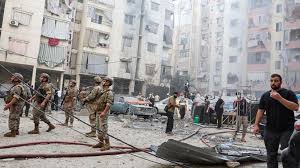
Ibrahim Aqil, a senior Hezbollah commander carrying a $7 million bounty placed by the United States, was killed in an Israeli airstrike on Friday in southern Beirut. Aqil, who played a key role in Hezbollah’s military operations and was implicated in the 1983 bombings of the US Embassy and Marine barracks in Beirut, was one of 14 people killed in the precision strike that targeted a meeting of Hezbollah’s high-ranking officials.
The airstrike marks a significant escalation in the ongoing conflict between Hezbollah and Israel, as the two have engaged in frequent skirmishes along the Israel-Lebanon border since October 7, when Hamas launched a deadly attack on Israel. Here are the major developments surrounding the incident:
- A Key Hezbollah Leader: Ibrahim Aqil, described as a “great jihadist leader” by Hezbollah, was wanted by the United States for his involvement in the 1983 Beirut bombings that claimed the lives of hundreds of Americans. He was also linked to the kidnapping of American and European hostages in the 1980s.
- $7 Million Bounty: The U.S. had placed a $7 million bounty on Aqil for his role in terrorist activities. His death is seen as a major blow to Hezbollah’s leadership, as he was one of the group’s top military figures.
- Massive Damage in Beirut: The airstrike caused significant destruction in Hezbollah’s stronghold in southern Beirut, leaving a massive crater and destroying a high-rise building. Rescue workers are still searching through the rubble for survivors, with at least 66 people reported injured.
- Hezbollah’s Response: In retaliation for the strike, Hezbollah launched dozens of rockets at Israeli military positions along the Israel-Lebanon border. This latest exchange has fueled fears of further escalation in the conflict.
- Leadership Crisis in Hezbollah: Aqil’s death comes just weeks after the killing of another senior Hezbollah commander, Fuad Shukr, in a similar Israeli airstrike. Both commanders were instrumental in Hezbollah’s military operations against Israel, and their loss is likely to create a leadership vacuum within the group.
- Planning Further Attacks: According to Israeli military officials, Aqil was killed while meeting with other commanders to plan attacks against Israel, including a potential invasion of northern Israeli territories as part of Hezbollah’s “Conquer the Galilee” operation.
- International Concerns: The United Nations and regional powers have expressed concerns over the growing escalation. UN Secretary-General Antonio Guterres called for restraint from all sides, while Iran, Hezbollah’s main ally, condemned the strike as a violation of international law.
- Iran’s Reaction: Iran’s foreign ministry denounced the attack and vowed retribution for Aqil’s killing. Israel, however, has defended the operation, stating it was necessary to neutralize threats to its national security.
- Cross-Border Fire Continues: Since the outbreak of the Gaza war in early October, Hezbollah and Israeli forces have exchanged fire almost daily along the border. The conflict, initially sparked by Hamas’ attack on Israel, has increasingly drawn Hezbollah into the fighting.
- Casualties and Escalation: Lebanon’s Health Ministry confirmed that 14 people were killed in the strike, with 66 others wounded. The toll is expected to rise as the search for survivors continues. Local residents have described the bombardment as some of the heaviest Lebanon has experienced in recent years.
As the situation remains tense, the possibility of further conflict looms large, with both sides showing no signs of backing down. International actors continue to call for de-escalation, but the ongoing violence between Israel and Hezbollah threatens to destabilize the region further.
Sources By Agencies


